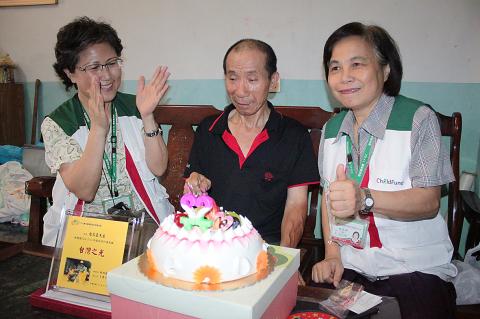A factory cleaner from Greater Taichung who has donated more than US$130,000 to charities was recently selected by the US magazine Forbes as one of its 48 Asian heroes of philanthropy.
Chao Wen-cheng (趙文正), 68, has donated about NT$4 million (US$133,600) over the past 30 years to orphanages in his hometown of Greater Taichung, as well as to the Taiwan Fund for Children and Families, World Vision Taiwan and the Tzu Chi Foundation.
In April, he sponsored a firefighting vehicle, which cost more than NT$600,000, for Greater Taichung’s Fire Bureau.

Photo: Yu Po-lin, Taipei Times
Having known the difficulties of being poor growing up in a low-income family, Chao, at 35, began donating about three-quarters of his modest salary, which is less than NT$20,000 a month, to charity after reading a story about a poor child in a newspaper.
As a father of five children, Chao also collects cans and bottles in the evenings to support his family.
“Once a young man teased me and said I look like a dog while I was finding recyclables in a garbage bin,” he said, adding: “I was almost in tears, but I ignored him as I knew I had to do it to make a living and provide a good education for my children.”
Although his children are now all grown up, Chao has no plans to stop doing what he does.
“I will never retire from my job, or from making donations to help people in need,” Chao said.
Living in an old house with no decorations and walls with faded paint in Wurih (烏日), Chao said he prefers not to spend money on himself, but to help others instead, adding that it pains him to see people suffer from poverty.
“I don’t make much money from collecting recyclables, but I saved every penny I earned and gathered them little by little,” he said.
Chao’s wife, Chao Hsieh Mei-yu (趙謝美玉), 64, supports his efforts.
“We don’t need a lot of money. My oldest child is 40 and one of them is a teacher,” Chao Hsieh said. “As long as my husband is happy, we can live a simple life and save more money to give to others.”
Taichung Mayor Jason Hu (胡志強), who wrote to the magazine to recommend Chao, said Chao was the pride of Greater Taichung and that his nomination has helped the world know the kindness of Taiwanese.
The other Taiwanese listed are all businessmen: Evergreen Group (長榮集團) founder Chang Yung-fa (張榮發), 84; Wowprime Corp (王品集團) chairman Steve Day (戴勝益), 58; and 84-year-old Chi Mei Group (奇美集團) founder Hsu Wen-long (許文龍).

CHAOS: Iranians took to the streets playing celebratory music after reports of Khamenei’s death on Saturday, while mourners also gathered in Tehran yesterday Iranian Supreme Leader Ayatollah Ali Khamenei was killed in a major attack on Iran launched by Israel and the US, throwing the future of the Islamic republic into doubt and raising the risk of regional instability. Iranian state television and the state-run IRNA news agency announced the 86-year-old’s death early yesterday. US President Donald Trump said it gave Iranians their “greatest chance” to “take back” their country. The announcements came after a joint US and Israeli aerial bombardment that targeted Iranian military and governmental sites. Trump said the “heavy and pinpoint bombing” would continue through the week or as long

TRUST: The KMT said it respected the US’ timing and considerations, and hoped it would continue to honor its commitments to helping Taiwan bolster its defenses and deterrence US President Donald Trump is delaying a multibillion-dollar arms sale to Taiwan to ensure his visit to Beijing is successful, a New York Times report said. The weapons sales package has stalled in the US Department of State, the report said, citing US officials it did not identify. The White House has told agencies not to push forward ahead of Trump’s meeting with Chinese President Xi Jinping (習近平), it said. The two last month held a phone call to discuss trade and geopolitical flashpoints ahead of the summit. Xi raised the Taiwan issue and urged the US to handle arms sales to

BIG SPENDERS: Foreign investors bought the most Taiwan equities since 2005, signaling confidence that an AI boom would continue to benefit chipmakers Taiwan Semiconductor Manufacturing Co’s (TSMC, 台積電) market capitalization swelled to US$2 trillion for the first time following a 4.25 percent rally in its American depositary receipts (ADR) overnight, putting the world’s biggest contract chipmaker sixth on the list of the world’s biggest companies by market capitalization, just behind Amazon.com Inc. The site CompaniesMarketcap.com ranked TSMC ahead of Saudi Aramco and Meta Platforms Inc. The Taiwanese company’s ADRs on Tuesday surged to US$385.75 on the New York Stock Exchange, as strong demand for artificial intelligence (AI) applications led to chip supply constraints and boost revenue growth to record-breaking levels. Each TSMC ADR represents

State-run CPC Corp, Taiwan (CPC, 台灣中油) yesterday said that it had confirmed on Saturday night with its liquefied natural gas (LNG) and crude oil suppliers that shipments are proceeding as scheduled and that domestic supplies remain unaffected. The CPC yesterday announced the gasoline and diesel prices will rise by NT$0.2 and NT$0.4 per liter, respectively, starting Monday, citing Middle East tensions and blizzards in the eastern United States. CPC also iterated it has been reducing the proportion of crude oil imports from the Middle East and diversifying its supply sources in the past few years in response to geopolitical risks, expanding